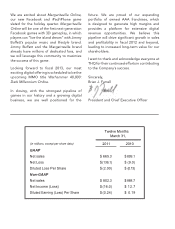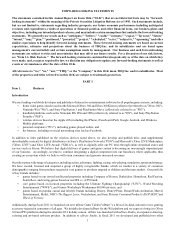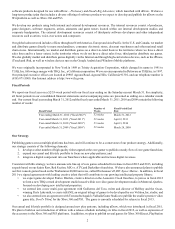THQ 2011 Annual Report Download - page 15
Download and view the complete annual report
Please find page 15 of the 2011 THQ annual report below. You can navigate through the pages in the report by either clicking on the pages listed below, or by using the keyword search tool below to find specific information within the annual report.to order additional products from the manufacturers. We believe that the direct relationship model we use allows us to better
manage inventory, merchandise and communications. We ship all of our products to our North American customers from
warehouses located in Michigan and Minnesota, and we ship most of our products to our international customers from warehouses
located throughout Europe and Asia Pacific.
As discussed in Part II—Item 7, "Management's Discussion and Analysis of Financial Condition and Results of Operations," we
typically only allow returns for our PC products; however, we may decide to provide price protection or allow returns for our
video games after we analyze: (i) inventory remaining in the retail channel, (ii) the rate of inventory sell-through in the retail
channel, and (iii) our remaining inventory on hand. We maintain a policy of giving credits for price protection and returns, but we
do not give cash refunds.
We also globally distribute games and content digitally via the Internet through PSN, Xbox LIVE, XBLA, and websites such as
Steam and Facebook, and through high-end wireless devices, such as the iPhone, iTouch, and iPad. Publishers are delivering a
growing amount of games, downloadable content and product add-ons by direct digital download through the Internet and gaming
consoles. We believe that much of the growth in our industry will come via online distribution such as massively multi-player
games (both subscription and free-to-play), casual micro-transaction based games, paid downloadable content and digital
downloads of games. Accordingly, we plan to continue integrating a digital strategy into our franchises where applicable, thus
creating an ecosystem which we believe will retain consumers and generate increased revenues.
3ODWIRUP/LFHQVH$JUHHPHQWV
Before we can develop, market, or sell video games on a console or handheld platform, we must enter into a license agreement
with the manufacturer of such platform. The current "platform manufacturers" are Microsoft, Nintendo and Sony. Each of these
platform license agreements allows us a non-exclusive right to use, for a fixed term and in a designated territory, technology that
is owned by the platform manufacturer in order to publish our games on such platform. We are currently licensed to publish, in
most countries throughout the world, titles on Xbox 360; PS3, PlayStation 2, and PSP; and the Wii and DS. Additionally, we are
authorized to develop and publish online content compatible with each console that utilizes online content. As each platform
license expires, if we intend to continue publishing games on such platform, we must enter into a new agreement or an amendment
with the platform manufacturer to extend the term of the agreement. Certain agreements, such as the licenses with Sony for the
PS3 and with Microsoft for the Xbox 360, automatically renew each year unless either party gives notice by the applicable date
that it intends to terminate the agreement.
Our platform licenses require that each title be approved by the applicable platform manufacturer. The platform manufacturers
have the right to review, evaluate and approve a prototype of each title and the title's packaging and marketing materials. Once a
title is developed and has been approved by the platform manufacturer, except for online content, the title is manufactured solely
by such platform manufacturer or its designated vendor. The licenses establish the payment terms for the manufacture of each
cartridge or disc made, which generally provide for a charge for every cartridge or disc manufactured, and also establish a royalty
rate for delivery of online content compatible with such manufacturer's platform. The amounts charged by the platform
manufacturers for both console discs and handheld cartridges include a manufacturing, printing and packaging fee as well as a
royalty for the use of the platform manufacturer's name, proprietary information and technology, and are subject to adjustment by
the platform manufacturers at their discretion.
The platform license agreements also require us to indemnify the platform manufacturers with respect to all loss, liability and
expense resulting from any claim against the platform manufacturer involving the development, marketing, sale, or use of our
games, including any claims for copyright or trademark infringement brought against the platform manufacturer. Each platform
license may be terminated by the platform manufacturer if a breach or default by us is not cured after we receive written notice
from the platform manufacturer, or if we become insolvent. Upon termination of a platform license for any reason other than our
breach or default, we have a limited period of time to sell any existing product inventory remaining as of the date of termination.
The length of this sell-off period varies between 90 and 180 days, depending upon the platform agreement. We must destroy any
such inventory remaining after the end of the sell-off period. Upon termination as a result of our breach or default, we must destroy
any remaining inventory within a minimum number of days as specified by the platform manufacturer.
6HDVRQDOLW\'HIHUUDORI5HYHQXH
The interactive entertainment software industry is highly seasonal, with sales typically significantly higher during the third quarter
of our fiscal year, due primarily to the increased demand for interactive games during the year-end holiday buying season.
Additionally, our net sales are impacted by the deferral and/or recognition of revenue from the sale of titles for which the online
service is more-than-inconsequential to the overall functionality of the game and for which we have a continuing involvement.
Such deferrals are recognized ratably over the estimated service period, generally six months, beginning the month after initial
6
























